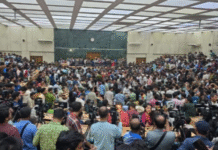

The Asian Development Bank is ready to give over $20 billion to finance Bangladesh’s road and railway projects but raised concerns over the timely implementation of schemes.
The Manila-based multilateral lender mentions the challenges facing implementation in a project portfolio review report submitted to the Bangladesh government last month.
The report does not mention over how long the money will be disbursed.
“Lack of comprehensive detailed design, including quality survey and investigation, contributes to significant scope changes, and time and cost overruns,” it says.
In some transport sector projects, appointing a contractor took over 20 months after the bidding was approved, it says, adding that the main cause of the delay was poorly prepared bidding documents.
“Land acquisition and resettlement is one of the major reasons transport projects require time extensions,” the report reads.
It is taking longer for development project proposal (DPP) preparation or revision, submission of the DPP to the line ministry and approval by the Executive Committee of the National Economic Council (Ecnec), it says.
The ADB presented an outline of projects in which it is likely to finance about $4.16 billion in the next three years.
A decade ago, ADB’s finance in the country’s transport sector was $741 million. In August this year, the lender’s finance in the sector was almost $3 billion, according to the report.
Referring to certain projects, the ADB says approval of revised DPP took over a year causing delays in project implementation.
The report cites a project titled “Transport Connectivity Improvement Preparatory Facility”, for which the ADB approved a loan of $42 million in February, 2020.
The loan agreement for the project was signed in June 2020 and the loan became effective in August that year. But no money has been spent from the fund yet. No consultants have been appointed to study the feasibility and finalise a detailed design of the project either.
A $400 million fund for another project titled “Dhaka-Sylhet Corridor Road Investment (trance 1)”, was approved by the ADB in September last year, but not a single penny has been utilised so far, the report says.
Project implementation also gets delayed over complications of land acquisition and compensation to the affected individuals, it says, adding that delays also take place in selecting and deploying resettlement NGOs or consultants for those who are evicted for the project.
Lack of understanding of FIDIC (International Federation of Consulting Engineers) contracts by the project management unit (PMU) or project implementation units (PIUs) staff, frequent changes of project directors, understaffed PIUs, and lack of coordination among supervision consultants and contractors delay the project implementation too.
FIDIC rules are the standard forms of contract for use between employers and contractors on international construction projects.
Poor supervision by consultants and repeated replacement of experts are responsible for weak contract management in many cases.
Besides, the settlement of audit observations takes a long time, which results in non-compliance of financial management. Many audit observations are pending for a long time for most projects, the report observes.
RECOMMENDATIONS
The ADB recommends strengthening the reviewing capacity of the implementing agencies and experts to improve the quality of project design, cost estimate, and procurement packaging.
Dedicated management teams at PMUs and PIUs, who are familiar with and experienced in working with the ADB in areas that include procurement, financial management, and FIDIC contracts, should be assigned.
The consultant recruitment and procurement should be streamlined.
The ADB also suggests using its project readiness facility to improve design, procurement readiness and establishment of a management team.
For land acquisition and resettlement, competent NGOs should be selected and the budget should be sufficient.
The ministry concerned and the Planning Commission should take necessary measures to reduce the time for DPP and revised DPP or technical project proposal approval to expedite progress.
To be able to meet the ADB’s project readiness criteria, advanced contracting and retroactive financing may improve project readiness for approval and reduce the risk of implementation delays, it adds.
The ADB has identified 16 road and railway projects the lender will finance in the next three years.
The projects include Laksam-Chattogram Dual Gauge Railway Project ($300 million); Dhaka-Sylhet Corridor Road Investment Project ($500 million); Dhaka Northwest Corridor Road Project-Phase 3 ($400 million); Line 5, Southern route of Dhaka Mass Rapid Transit Development Project ($300 million); Phase 1 of Dhaka-Cumilla Chord-line Project ($300 million); Phase 1 of Dhaka-South Corridor Road ($400 million); Dhaka-Chattogram PPP Highway Project ($400 million); and Phase 2 of Dhaka Northwest Corridor Road Project ($200 million).










